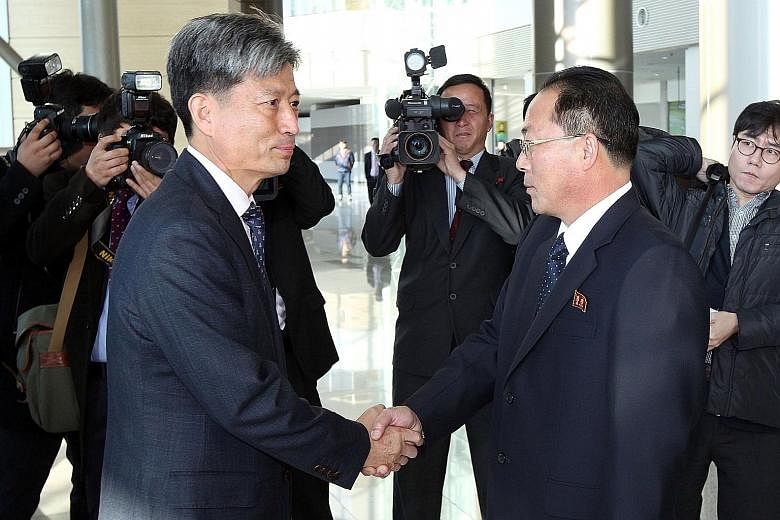SEOUL • North and South Korea sat down to rare high-level talks yesterday with each side looking to squeeze concessions on stalled cross-border programmes in which both their leaders have a political stake.
The vice-minister-level dialogue, held in the Kaesong joint industrial zone on the North Korean side of the border, was the fruit of crisis talks in August that ended an armed stand-off involving an exchange of artillery fire across the border. The last such meeting, with a mandate to discuss a range of inter-Korean issues, was held nearly two years ago.
"The outcome this time could have a significant impact on the path the overall inter-Korea relationship takes next year," said Mr Cheong Seong Chang, an analyst at the Sejong Institute think-tank in Seoul.
Although any talks between the two Koreas are welcomed as a positive step, precedent suggests any significant breakthrough is unlikely.
The North was expected to seek the resumption of cross-border tours from the South to its Mount Kumgang resort, a once-lucrative source of cash for the impoverished state that was suspended in 2008.
Seoul, in turn, was expected to try to get Pyongyang to agree to hold reunions of war-separated families on a regular basis, a top humanitarian priority for the South, where more than 60,000 mostly elderly people are looking for relatives in the North.
"Between South and North, there are many issues to discuss and resolve. We will do our best to work them out step by step," South Korean Vice-Unification Minister Hwang Boo Gi told reporters before boarding a bus to cross into Kaesong. His counterpart is Mr Jon Jong Su, a vice-director of the North's Committee for the Peaceful Reunification of Korea.
Efforts to establish a regular dialogue have tended to falter rapidly after an initial meeting - a reflection of the deep mistrust between two countries that have remained technically at war since the end of the 1950-53 Korean conflict.
The elephant in the room at any North-South dialogue is Pyong-yang's nuclear arms programme. But while Seoul may well raise the issue of denuclearisation, experts said the two sides were likely to focus on more achievable targets.
"The North's denuclearisation needs to be seen as the ultimate goal of inter-Korea dialogue, not a precondition of it," said Professor Kim Keun Shik of the University of North Korean Studies in Seoul.
The talks come a day after North Korean leader Kim Jong Un appeared to claim that his country had developed a hydrogen bomb, which is more powerful than an atomic bomb, although experts and US and South Korean officials expressed doubt that the North had such capability.
Also on Thursday, the United Nations Security Council held its second meeting on human rights in North Korea despite the objections of four countries including China, Pyonyang's main diplomatic and economic backer.
The Kaesong industrial zone, founded in 2002, is the last remaining major joint project to result from an earlier period of improved ties.
AGENCE FRANCE-PRESSE, REUTERS

